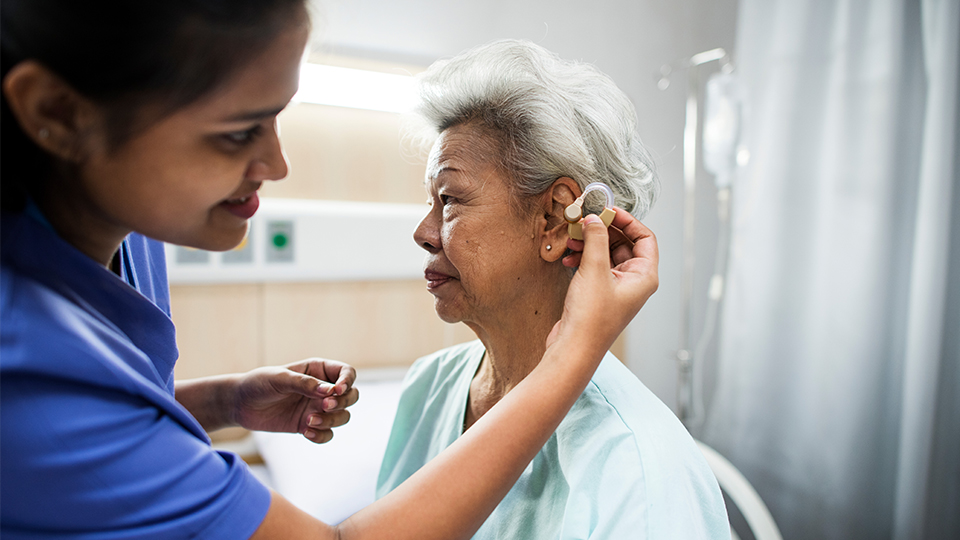Using hearing aids decreases the risk of cognitive decline by 20%, a NUS Medicine study
Published: 03 Jan 2023

An elderly woman putting on a hearing aid with the help of a healthcare professional. Copyright: rawpixel
Hearing loss is a well-established risk factor for cognitive decline and developing dementia. However, it was found that the use of hearing restorative devices decreases the risk of long-term cognitive decline by 20%, based on a study conducted by students and researchers from the Yong Loo Lin School of Medicine, National University of Singapore (NUS Medicine).
Published in JAMA Neurology, the study was conducted based on observational data collected from 31 studies, comprising over 130,000 study participants. Participants with hearing loss who used hearing restorative devices had an approximately 20% decrease in the risk of long-term cognitive decline. When assessing their cognitive abilities, there was a 3% improvement in the cognitive test scores which assesses short-term cognition.
As the data used is observational, it is not possible to definitively conclude a cause-and-effect relationship, and the results should be interpreted within the boundaries of the study. Nevertheless, the team’s findings further confirm that implementing targeted interventions to restore some degree of hearing is necessary to prevent or slow cognitive decline and dementia.
Affecting one in five people globally, hearing loss is becoming increasing common as Singapore’s population ages. Hearing loss is also one of the top risk factors for dementia, which detrimentally affects a patient’s function and quality of life. As a debilitating condition, it causes high rates of disability, and death among older people worldwide. Since there is no definitive cure to treat dementia, tackling modifiable risk factors is key towards preventing this syndrome from developing and worsening.
“Dementia is exceedingly difficult to reverse, once it sets in. Screening and treating age-related hearing loss are simple and non-invasive, so we would encourage older adults and their families to take this simple step to preserve their cognition today,” said senior study author Dr Benjamin Tan, Dean’s Fellow at NUS Medicine.
This study is led by a team of medical students and researchers from NUS Medicine, which includes third-year medical students Brian Yeo Sheng Yep and Harris Song Jun Jie Muhammad Danial, fifth-year medical student Emma Toh Min Shuen. They were guided by Dr Benjamin Tan Kye Jyn, Associate Professor Loh Woei Shyang and Assistant Professor Ng Li Shia from the Department of Otolaryngology, Associate Professor Reshma Aziz Merchant from the Department of Medicine, as well as Professor Roger Ho and Assistant Professor Cyrus Ho from the Department of Psychological Medicine.
Speaking as the study’s co-lead and the significance of early detection and intervention in targeting hearing loss, third-year medical student Brian Yeo said, “Our study suggests that the benefits accrue over time. The cognitive benefits may be small in the short-term, but the benefits are more pronounced in the long run. It is encouraging to note that patients with mild cognitive impairment, or early dementia, showed some improvement in cognitive abilities after using hearing devices, so early detection and treatment has proven to be extremely vital.”
“Currently, there is insufficient data on the association between the intervention of hearing loss and the progression of dementia. Our study hopes to further contribute to the prevailing evidence that, the active management of hearing loss can potentially help to reduce or delay cognitive decline,” said Associate Professor Loh Woei Shyang, Head of Department of Otolaryngology at NUS Medicine.
Read more in the press release here.
News Coverage

